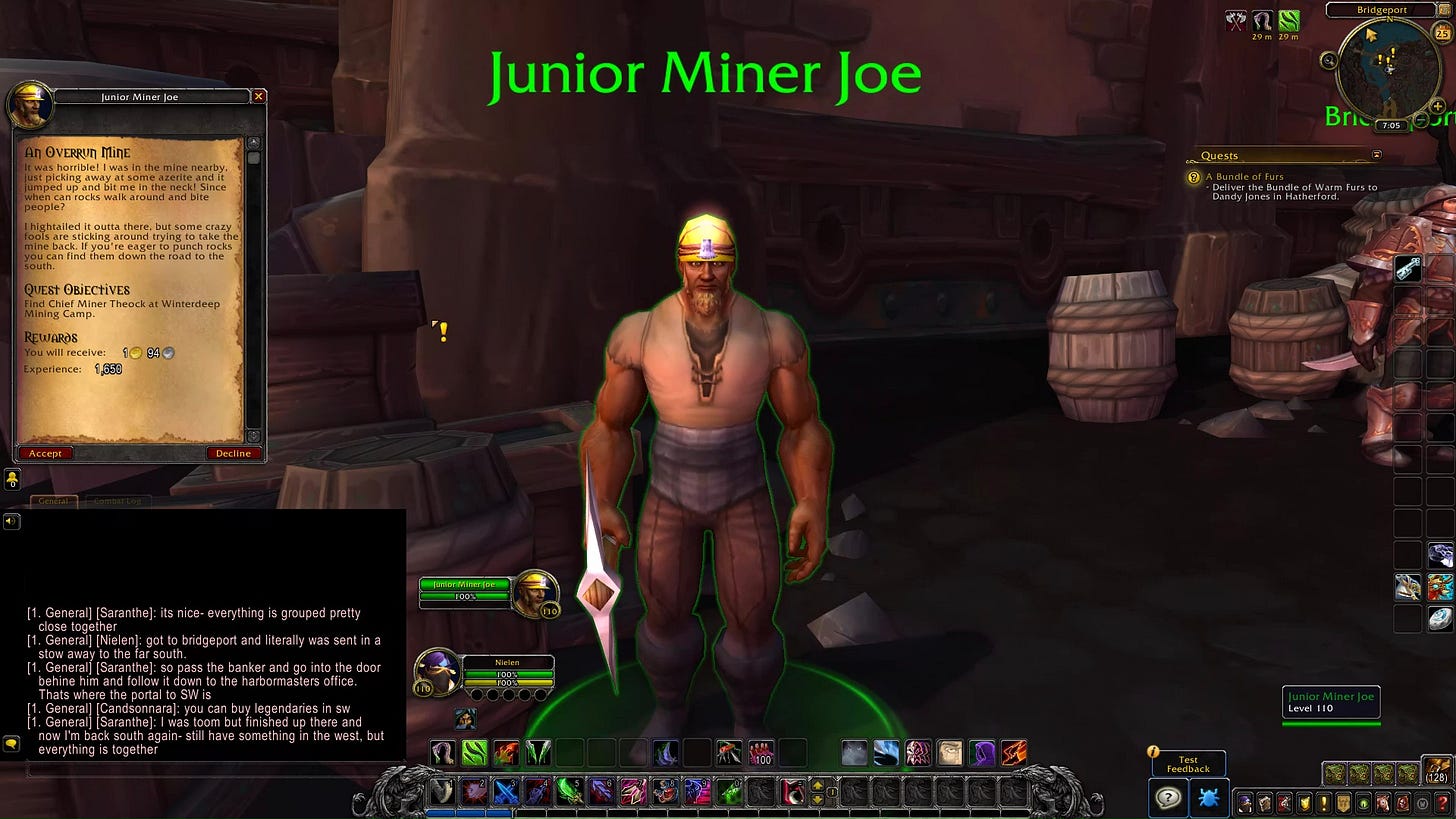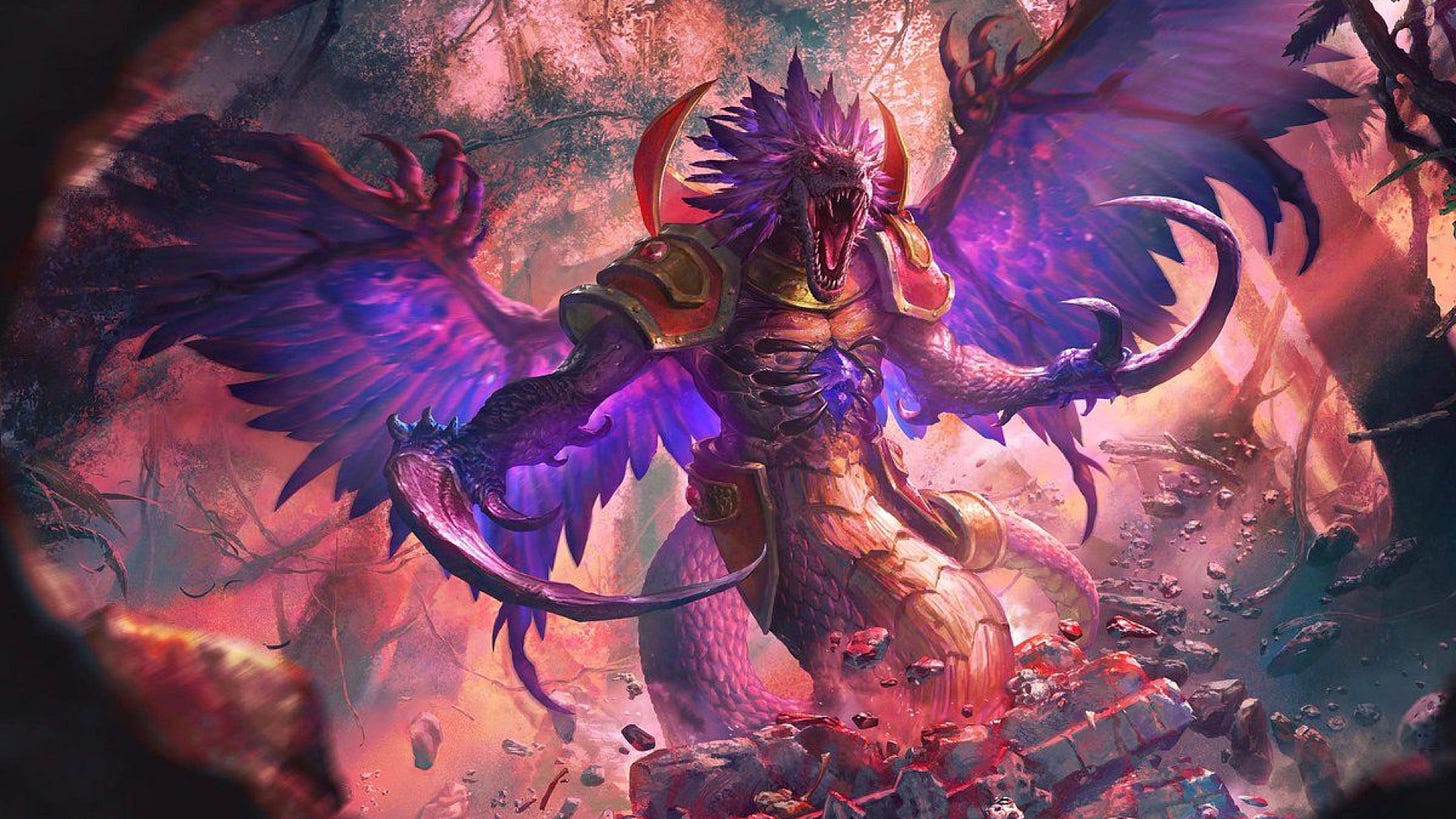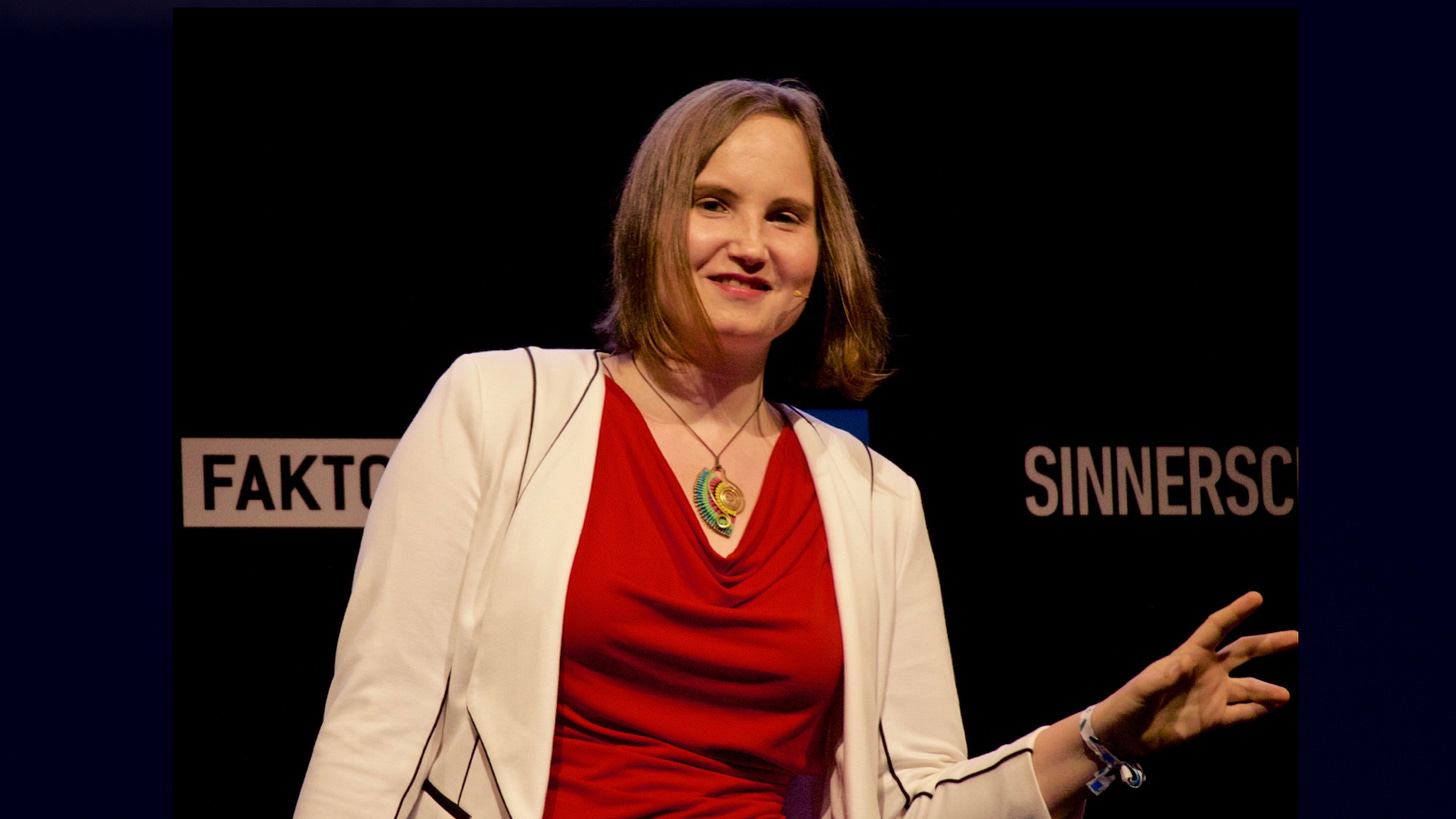Pixels, Pandemics, & The Protestant Work Ethic or: How I Learned to Stop Worrying and Love World of Warcraft (Again)
10:41-min read
Hello from 20 Minutes into the Future. In this edition we’re looking at World of Warcraft's strange mix of capitalism and plague. I originally posted this over at Nothing Here. Nothing Here is a newsletter I co-write with sci-fi authors Corey White, Marlee Jane Ward, and M1k3y. If you've already read it there then you skip down for your weekly dose of news, bastards, and kindred spirits.

“What’s your /played?” is a question that can strike fear into the heart of a World of Warcraft (WoW) player.
/played is a command you can enter into the chat interface. It returns a value in days/hours/minutes/seconds format. That cold logic is the most stark reminder that massively multiplayer online roleplaying games come with an opportunity cost.
My /played is currently. 443 days, 16 hours, 5 minutes, and 50 seconds.
That’s 10,648 hours of my life spent in a fictional world. First slaughtering feral pigs for innards but over time doing battle with Blood Gods. But it is a whole lot of grunt work. Kill this to get that, deliver this box to that person right over there, dig through shit to find something, etc.
That clock started ticking for me about a month or two after the game launched in November, 2004. Like any pre-Facebook online experience anonymity was the norm. And that comes with pros and cons. Lots of assholes, but quite a few friends and good times along the way too. But work. An awful lot of work.
According to the U.S. Office of Personnel Management, the U.S federal standard for full time workers is 2,087 hours per year. That’s 5.1 years of my life spent toiling for the citizenry of Azeroth. You can shave off some time for the virtual heroics of proper monster-slaying but you’re still looking at an awful lot of busy work to get there.
The Prosperity Gospel made manifest in pixels. I’m surprised the game doesn’t contain an epic mace with that for a name. At times the creators of WoW seem to have more in common with the likes of Travis Kalanick than J. R. R. Tolkien.
Western players refer to this alternatively as “farming” and “grinding”. Chinese players (WoW is BIG in China) call it “brushing.” If German sociologist and economist Max Weber were alive today he’d likely see similarities to the protestant work ethic as laid out in his seminal work, The Protestant Ethic and the Spirit of Capitalism:
The Puritan wanted to work in calling; we are forced to do so. For when asceticism was carried out of monastic cells into everyday life, and began to dominate worldly morality, it did its part in building the tremendous cosmos of the modern economic order. This order is now bound to the technical and economic conditions of machine production which today determine the lives of all the individuals who are born into this mechanism, not only those directly concerned with economic acquisition, with irresistible force. Perhaps it will so determine them until the last ton of fossilized coal is burnt. In Baxter’s view the care for external goods should only lie on the shoulders of the 'saint like a light cloak, which can be thrown aside at any moment.' But fate decreed that the cloak should become an iron cage.
Scott Rettberg, a professor of digital culture at the University of Bergen in Norway in his paper, Corporate Ideology in World of Warcraft argues:
The fact that grinding is required to level up and achieve reputation cannot however alone explain why so many World of Warcraft players tolerate, or even welcome, the repetitiveness and tedium of grinding. I contend that the appeal of this type of activity is threaded deeper into the subconscious of the capitalist mind, which has been trained to appreciate work itself as a moral good.
Bonnie Nardi emeritus professor of the Department of Informatics at the University of California, Irvine disagrees with that sentiment. She instead argues in her book, My Life as a Night Elf Priest: An Anthropological Account of World of Warcraft that something more prosaic but no less crass in its obvious capitalism is at play:
Rather than games as training grounds for the workplace, a more straightforward explanation is ready to hand, at least for farming in World of Warcraft. Farming was woven into the game as a design element to provide game content at a cost that increased corporate profit margins. Farming slowed players so they did not rip through months of careful content development in a few days or weeks. Blizzard’s incorporation of farming reduced its need for development by inserting a necessary but time-consuming activity into the game that kept players busy.
Both of those statements feel true to me as a long-time, on-again, off-again player. The telling thing is how much the culture in the game mimics corporate life. Rettberg again:
Guilds, the core social unit in World of Warcraft, are also often structured like companies. Most guilds hold regular meetings and have guild leaders (the in-game equivalent of a CEO) and other officers, such as a treasurer who maintains a guild bank. Guild leaders or an executive committee of officers arbitrate disputes, distribute loans, armor, and weaponry, and plan organized campaigns.
What’s more, players were drawing apples to apples comparisons between skills they exhibited in WoW and the ones they needed to get ahead in the workplace. So much so that they began listing WoW as experience on their resumés. The Wall Street Journal, CNN Money, and Harvard Business Review all felt the need to fill column inches about the phenomenon.

The inequities of capitalism on Earth are mirrored in Azeroth. Affluent players in the West pay real-world money to gain in-game currency and items from “Chinese gold farmers.” Whether it’s for a pair of Nikes or +8 agility magic boots, 12 hour+ work days in sweatshop conditions, at low-pay, is still despicable. The in-game chat memes that developed due to this were every bit as racist as you might suspect. Money is always othering. Whether it’s gold or dollars.
Farming is by no means unique to WoW. Animal Crossing New Horizons is being hailed by many as a mental health salve during the Covid crisis. Some American players however are turning to the game to make ends meet. The damage capitalism inflicts abroad always finds its way home. Always.
In the midst of COVID-19, some New Horizons players are turning to World of Warcraft-style gold farming methods to make ends meet. In early April, Lexy, a 23-year-old recent college grad, created a Twitter account offering up bells (Animal Crossing’s in-game currency) for real-world cash (she requested we refer to her by a nickname to avoid potential reprisal from Nintendo). “I got laid off due to COVID so I'm farming bells in ACNH,” she wrote. “I really need to make rent this month so I'm selling 2 mil bells per $5, please message me if interested, I'll give you a discount the more you buy.”
The pandemic has been a boon to video game publishers. Activision Blizzard, makers of WoW (and Call of Duty and Overwatch) has seen net revenues climb to $1.44bn (£1.16bn). In Q1, 407 million people had played its games online each month.

WoW, however, has a much more interesting relationship to pandemics. In 2005 Blizzard introduced players to the raid boss Hakkar The Soulflayer. Hakkar is the Blood God of the Gurabashi Troll empire. Trolls in WoW have Jamaican accents and worship Loa. Despite all that Hakkar was a visual homage to Quetzalcoatl
Hakkar’s most lethal spell was “Corrupted Blood.” Corrupted Blood dealt damage on cast and over time to players. What’s more it could spread to others based on proximity. Most effects like this tend to disappear from players when they leave a raid instance. However a bug in how it was originally coded meant that the same was not true of pets owned by hunters.
When hunters returned back to capital cities they innocently summoned their pets again. The pets were still infected and the disease spread from them to other players and non-players as well. Low-level characters were killed instantly.
Anonymity, as I suggested earlier, can bring out the asshole in people. “Griefing” in community parlance. It didn’t take long for malicious players to weaponize Hakkar’s spell for their own sick lols.
Gamemasters even intervened with a wide-range of efforts. They would attempt to quarantine infected areas. And of course ban asshole players when possible.
The Corrupted Blood Incident became a touchstone for real-world epidemiologists:
An epidemiologist named Eric Lofgren, then at Tufts University, just happened to be an avid WoW player and was fascinated by the real-world parallels to how the epidemic played out in the virtual world. He and his Tufts colleague, Nina Fefferman, co-authored a 2007 paper published in Lancet Infectious Diseases examining the potential implications of the Corrupted Blood incident for refining existing epidemiological models
"For me, it was a good illustration of how important it is to understand people's behaviors," he recently told PC Gamer about the earlier WoW study. "We often view epidemics as these things that sort of happen to people. There's a virus and it's doing things. But really it's a virus that's spreading between people, and how people interact and behave and comply with authority figures, or don't, those are all very important things. And also that these things are very chaotic. You can't really predict 'oh yeah, everyone will quarantine. It'll be fine.' No, they won't."
I, of course, have been in quarantine. I’ve been working from home since February. In my day job I’ve been connected to multiple Covid-19 responses. Working with epidemiologists who use models informed by Lofgren and Fefferman’s work. It’s all a bit surreal.
That work has been demanding. A few weeks ago I finally acknowledged I needed to practice some self-care. Despite misgivings about its crass capitalism, I re-upped my dormant WoW subscription.
Resiliency by way of escapism. It’ll do for the time being. There’s no telling what my /played will be by the time this fucking pandemic is over.
Dig deeper
You can read about big tech’s unjust and dangerous enabling of capitalism in the real world with these stories from the 20 Minutes into the Future archive:
Not a subscriber yet? 20 Minutes into the Future is 100% ad free and always will be. Sign up for weekly commentary & related links to help you dig deeper into big tech behaving badly.
10 stories this week

Zuckerberg has never been accountable to anyone his entire adult life. And it shows.
Now More Than Ever, Facebook Is a ‘Mark Zuckerberg Production’ (The New York Times)When you control overwhelming market share across the entire funnel then yeah, it’s a rigged system.
U.S. Is Said to Plan to File Antitrust Charges Against Google (The New York Times)“Instead of simply taking down false content tech companies could also offer up their best and brightest to help public health authorities deploy microtargeted ad campaigns to promote compliance with measures to combat the transmission of COVID-19.”
Maybe it’s time to retire the idea of “going viral” (MIT Technology Review)It’s a massive astroturfing campaign. The lockdown protesters are not working class. The working class overwhelmingly support the lockdown.
The Coronavirus Class War (New York Magazine)One of the many reasons why the individual lens of privacy frameworks is flawed:
“The recordings were not limited to the users of Apple devices, but also involved relatives, children, friends, colleagues, and whoever could be recorded by the device.”
Apple whistleblower goes public over 'lack of action' (The Guardian)Palantir is using Gotham — the same platform it normally sells to law enforcement — for this project. So yes, the mandated public health data is going to enrich their existing products and bottom line.
“If they’re accessing these rich data sets directly from our public health infrastructure, will they exploit that to add economic value to their core data sets? If their AI learns how to infer and predict the patterns of the disease from our public data, then that becomes a hugely lucrative advantage for a private company, especially now when everyone, in every business sector, wants to know where COVID is going and how hard it’s going to hit,” said Shoshana Zuboff, the author of The Age of Surveillance Capitalism and a professor emerita at Harvard Business School.
FEMA Tells States to Hand Public Health Data Over to Palantir (The Daily Beast)
“One in four American adults is disabled. It’s been 30 years since lawmakers passed the Americans With Disabilities Act to make the country—and later, some argue, the internet—more accessible. But now, as we shift to working, schooling, shopping, and communicating virtually, the pandemic is showing how many holes remain in digital accessibility.”
The Inaccessible Internet (Slate)Magical thinking and critical thinking are diametrically opposed to one another.
Why Your Christian Friends and Family Members Are So Easily Fooled by Conspiracy Theories (Inter-Faith Now)“The data, provided to the Guardian by the progressive campaign group the Committee to Protect Medicare, raises the prospect that the protests will play a role in spreading the coronavirus epidemic to areas which have, so far, experienced relatively few infections.”
US lockdown protests may have spread virus widely, cellphone data suggests (The Guardian)Startups use VC cash to artificially drive down costs. They do this to take over whole markets and then raise prices. It’s a magic trick designed for maximum wealth extraction to make the poor poorer and the rich richer.
Doordash and Pizza Arbitrage (Margins)
Sick and tired of big tech behaving badly? 20 Minutes into the Future is about holding the bastards to account. One way we can do that is by spreading the word of their misdeeds.
Bastard watch

Jack Dorsey is a right bastard. Twitter has great policies in place to try to prevent harm. What they lack is the spine to apply them evenly. Instead he allows revenue-generating accounts like Donald Trump and Elon Musk to fuel armed insurrection, and to spread health misinformation during a pandemic, and voting disinformation during an election year. He is a venal and craven Goop product that’s somehow gained sentience.
Kindred spirits

Nell Watson is ML researcher and tech ethicist. I first became of her and her work at The BIMA Conference in 2019. In her talks and articles she examines how algorithms gaslight us, how we might use tech to make a fairer society, to pondering the notion of supermoral machines. Nell wrestles with big questions with a social reformer’s pragmatic optimism. You’d do well to follow her work.
We need more Nells and less Jacks working in tech today if we want a better tomorrow.
Thanks for reading 20 Minutes into the Future. Have a friend or colleague who'd like the newsletter? Invite them to sign up.
Good night and good future,
Daniel
20 Minutes into the Future is a critical look at how technology is shaping our lives today. And what actions we can take for a better tomorrow. If you're not already a subscriber and found this newsletter worth your while then please sign up.
My name is Daniel Harvey and I write 20 Minutes into the Future. I’m a product designer and have written for Fast Company, Huffington Post, The Drum, & more. If you're pissed about the current state of tech and want to see us do better then you’ve found a kindred spirit.
You can email me at daniel.harvey@gmail.com or follow me on Twitter @dancharvey.



